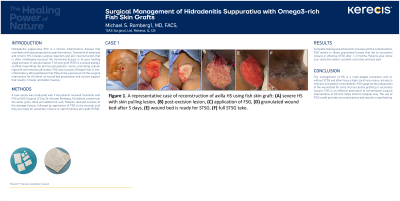Back

Case Series/Study
(CS-124) Surgical Management of Hidradenitis Suppurativa with Omega3-rich Fish Skin Grafts

Co-Author(s):
Introduction: Hidradenitis suppurativa (HS) is a chronic inflammatory disease that manifests with abscesses and sinuses formations. Treatment of advanced and chronic HS includes surgical resection and skin reconstruction that is often challenging because the remaining tissues is at poor healing stage and lack of vascularization. Fish skin graft (FSG) is a unique biologic scaffold resembling the dermal extracellular matrix, promoting cellular ingrowth and neovascularization. FSG also contains Omega3 that is anti-inflammatory. We hypothesize that FSG can be used as part of the surgical intervention for HS either as wound bed preparation and closure support that results in faster and better healing.
Methods: A case series was conducted with 9 HS patients received treatment with FSG at SAS Surgical LTD by Dr. Michael Romberg. HS defects varied from the axilla, groin, labia and abdominal wall. Patients received excision of the damage tissues, followed by application of FSG to the wounds until they are ready for secondary closure or split thickness skin graft (STSG).
Results: Complete healing was achieved in all cases without complications. FSG results in faster granulated tissues that led to successful closure or effective STSG after 1-3 months. Patients also notice scar reduction, better cosmetic outcomes and less pain.
Discussion: The management of HS is a multi-staged procedure with or without STSG and often faces a high risk of recurrence rate due to infection and patient comorbidities. FSG supports the preparation of the wound bed for early and successful grafting or secondary closure. FSG is an effective alternative to conventional surgical interventions of HS that helps shorten hospital stay. The use of FSG is safe, provides no complications and results in rapid healing.
Trademarked Items: *KerecisTM, Kerecis, Isafjordur, Iceland
References:
Methods: A case series was conducted with 9 HS patients received treatment with FSG at SAS Surgical LTD by Dr. Michael Romberg. HS defects varied from the axilla, groin, labia and abdominal wall. Patients received excision of the damage tissues, followed by application of FSG to the wounds until they are ready for secondary closure or split thickness skin graft (STSG).
Results: Complete healing was achieved in all cases without complications. FSG results in faster granulated tissues that led to successful closure or effective STSG after 1-3 months. Patients also notice scar reduction, better cosmetic outcomes and less pain.
Discussion: The management of HS is a multi-staged procedure with or without STSG and often faces a high risk of recurrence rate due to infection and patient comorbidities. FSG supports the preparation of the wound bed for early and successful grafting or secondary closure. FSG is an effective alternative to conventional surgical interventions of HS that helps shorten hospital stay. The use of FSG is safe, provides no complications and results in rapid healing.
Trademarked Items: *KerecisTM, Kerecis, Isafjordur, Iceland
References:

.png)